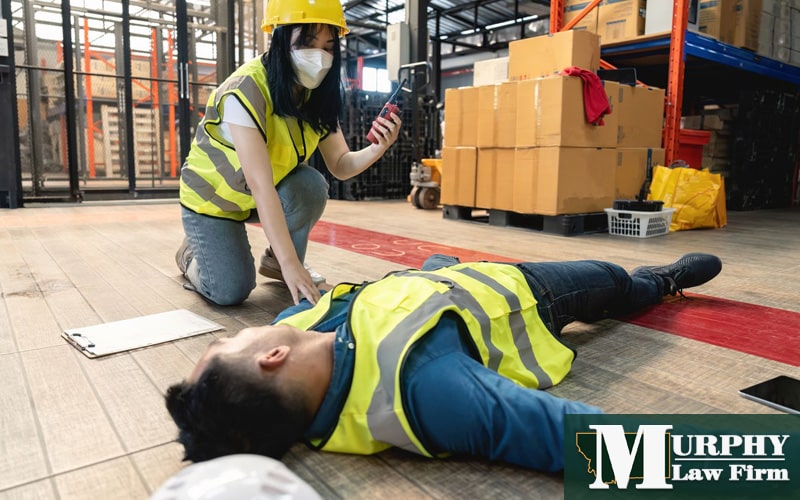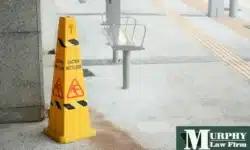
Learn about your rights to compensation after a slip-and-fall accident at work
Slip-and-fall accidents are a major cause of injuries at work. In fact, according to the Centers for Disease Control and Prevention (CDC), slip-and-fall accidents are 1 of the top 3 leading causes of workplace accidents that require workers to get emergency room treatment.
Whether it’s due to wet or slippery floors, uneven surfaces, cluttered walkways or inadequate lighting, these accidents can happen in any workplace, often leading to serious injuries that may require workers to take time off work to recover.
Fortunately, most Montana workers who are injured on the job are eligible for workers’ compensation benefits for medical expenses and lost wages while they heal.
Facts about slip-and-fall accidents at work
The nature of work in the construction industry puts these workers at a high risk for slip-and-fall accidents. In fact, according to data from the U.S. Bureau of Labor Statistics (BLS), the construction industry accounted for more than 46% of all fatal falls, slips, and trips in 2020. These accidents comprised slightly more than one-third of the construction industry’s work-related deaths.
Did you know?
Most fatal slip-and-fall accidents on construction jobs involve a fall from an elevated height to a lower level.
Although construction workers are exposed to a variety of work-related risks that can lead to slip-and-fall accidents, these accidents can occur in almost any workplace.
Common causes of slip-and-fall accidents at work
Slip-and-fall accidents are generally more likely to occur if there’s an unsecured object on the floor, a spill that creates a slippery surface, or flooring that’s in need of maintenance or repair.
Other common causes of slip-and-fall accidents include the following:
- Wet, icy or snowy walkways
- Poor lighting
- A loose rug or mat
- Trailing cables
- Obstructed views
- Distracted workers
- Improper use of safety equipment
- Failure to use safety equipment
- Failure to follow safety rules and regulations
Common injuries after a slip-and-fall accident
Injuries from a slip-and-fall accident can range from minor to very severe. These accidents commonly cause the following:
- Back injuries
- Broken bones
- Traumatic brain injuries
- Brain bleed
- Bruising
- Neck and spinal cord injuries
- Torn ligaments and tendons
- Muscle strain
How do I know if my injury is covered under Montana workers’ comp?
Montana requires most employers that employ 1 or more full or part-time employees to provide workers’ compensation coverage to these workers. Slip-and-fall injuries that occur in the course of a worker’s employment are generally covered by workers’ compensation.
The worker’s compensation system is no-fault. Therefore, an injured worker may receive compensation without regard to whether the worker or the employer was at fault in the accident.
Eligibility for Montana workers’ compensation benefits
Montana workers are generally eligible for workers’ compensation if they’re classified as employees. Independent contractors, volunteers, domestic employees and certain sole proprietors are typically not eligible to receive workers’ comp benefits unless an employer specifically offers coverage.
However, independent contractors can purchase workers’ comp insurance to cover themselves when working on a contractual basis.
Types of workers’ comp benefits
The amount and type of compensation injured workers may receive depends on the impact the injury has on the worker’s life. Workers’ compensation benefits may include the following:
- Income supplementation (typically two-thirds of your average weekly wage) if you must miss work due to your injury
- Compensation for all necessary medical expenses related to your workplace accident, including rehabilitation
- Death benefits paid to certain dependents if the accident causes your death
Steps to file a workers’ comp claim in Montana
In the event of a workplace accident in Montana, take the following steps to file a workers’ comp claim:
- Seek medical attention. You should see a doctor as soon as possible after any work accident so you’ll have documentation linking your injuries to your job.
- Notify your employer. Montana state law requires injured workers to notify their employer of the workplace accident that caused their injury within 30 days.
- Employer files necessary paperwork. Within 6 days of receiving notification of the accident, state law requires the employer to file a First Injury Report form. They then have up to 1 year to file a claim with their workers’ compensation insurer.
- Wait for claim approval. Within 30 days of the employer submitting the claim, the employer’s insurer will either accept or deny the injured worker’s claim.
- Contact an attorney. If your claim is denied, you should contact a workers’ compensation attorney to assist you with an appeal.
Eligible workers are entitled to begin receiving income supplementation on the 5th day of income loss due to the injury. Although workers may begin the process on their own, it is always better to consult a Montana workers’ compensation attorney to ensure your rights are protected.
Avoiding slip and fall accidents at work
Employers and their employees can take steps to minimize the risk and occurrence of slip-and-fall accidents in the workplace. Employers should implement extensive safety protocols and provide supervision to ensure workers follow the safety rules.
Workers should immediately notify their employer of known hazards that may elevate the risk of a slip-and-fall accident taking place. Employees should also wear appropriate footwear and use safety equipment as recommended to minimize the risk of slipping and falling. Keeping work areas clean and organized also reduces the risk of an unsecured object falling onto the floor and creating a tripping hazard.
Choosing a Great Falls workers’ compensation attorney
If you experience a slip-and-fall accident on the job that results in significant injuries or requires extended time off work, it’s highly recommended that you contact an attorney for help with your claim.
An experienced workers’ compensation attorney understands how much your claim should be worth and can negotiate with your employer and their insurer to get you maximum compensation. If a challenge arises in the workers’ comp process, an attorney can effectively respond to the challenge in a timely manner to ensure there’s no delay in you receiving your benefits.
If you’ve been injured in an accident at work in Great Fall, Montana, contact the experienced work injury attorneys at Murphy Law Firm. Our dedicated attorneys have more than 75 years of combined experience helping injured workers in Montana get the compensation they deserve.
Contact us today for a free consultation of your case.



